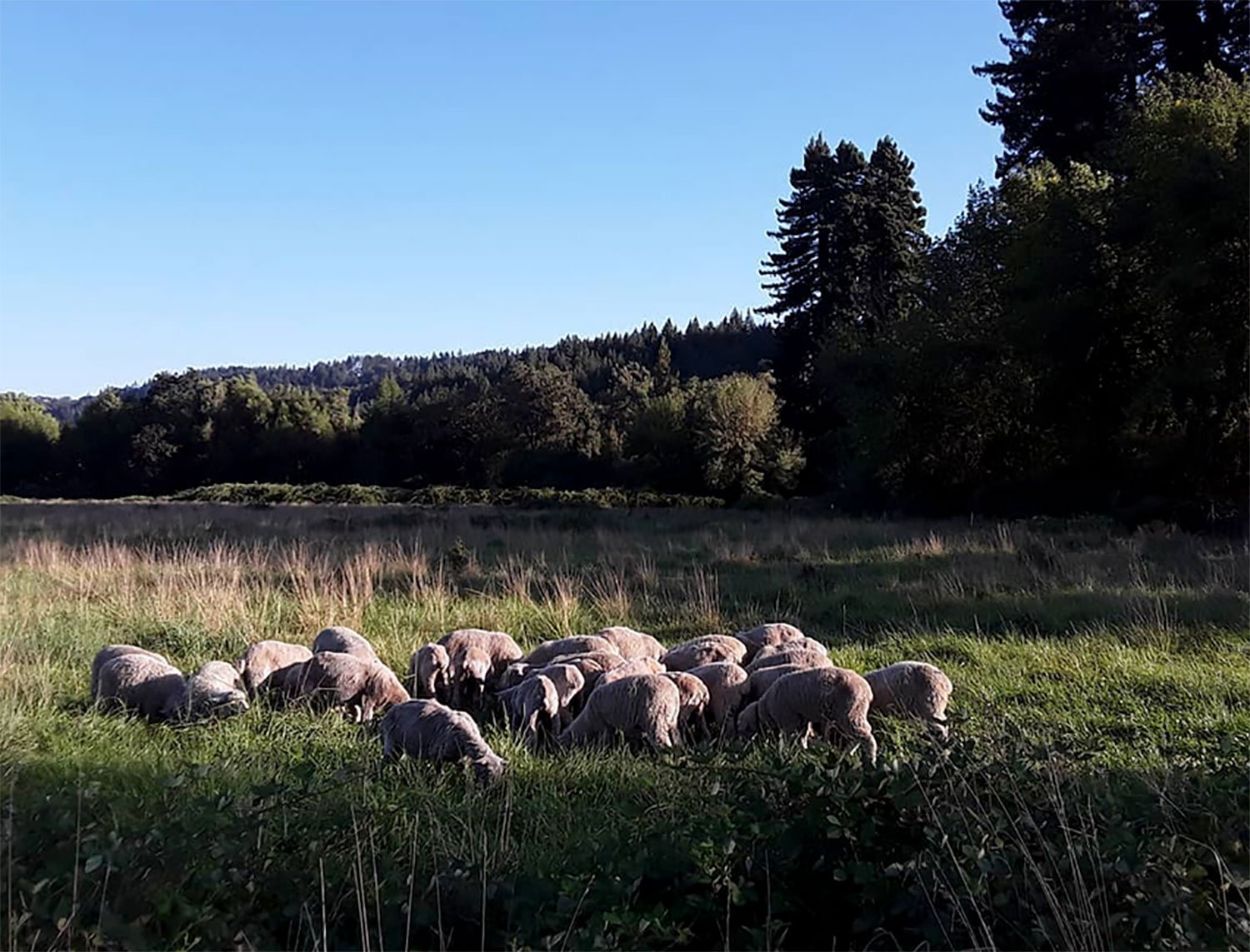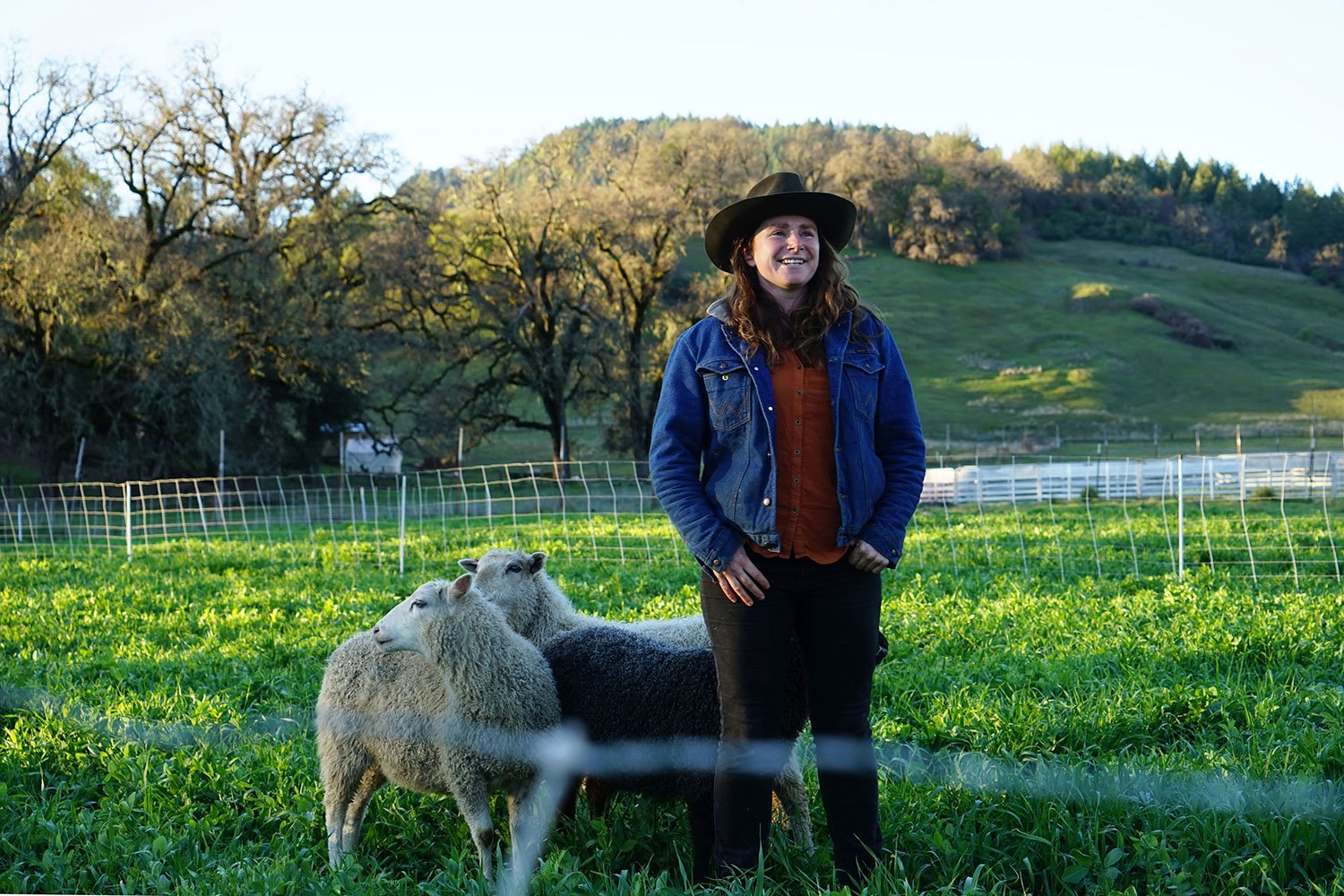Collaborative Farming

The Women Writing a New Chapter in Mendocino County’s Rich Agricultural Heritage
by Lisa Ludwigsen
Mendocino County is known for many things—stunning coasts, exceptional art and music, old grove redwoods, and top-notch wine and cannabis. Less familiar but just as important is the rich heritage of farming and ranching built and maintained by generations of people deeply connected to this place. And, as anyone in agriculture knows all too well, farming and ranching are challenging. Land, crops, animals, and businesses need continual tending. Even in off-season, tas
ks abound.
Fortunately, inland Mendocino County is home to a group of young farmers, ranchers, and community organizers who have begun to move outside of traditional farming models, creating joint agricultural endeavors and/or assuming leadership of existing farms and ranches. Their collaborative efforts are opening new avenues for networking and support which they hope will allow everyone to have a fair and equitable balance for long-term sustainability.
Interestingly, many of these new agricultural leaders are women. Farmer Caroline Radice and rancher Ruthie King are among those running their small-scale operations at Ridgewood Ranch south of Willits. The picturesque property has an interesting and varied history. Originally a native Pomo village, it later became a 5,000-acre working horse ranch and the retirement home of renowned race horse, Seabiscuit. Today, Ridgewood Ranch is owned by the Church of the Golden Rule who rents the land to a burgeoning group of farmers and ranchers. In addition, it is the site of a residential farm school—The School of Adaptive Agriculture—that teaches all aspects of building a farming business.
Caroline is a popular caterer and organic farmer, providing produce for local restaurants, farmers markets, and other wholesale accounts. Her farm acreage also serves as a hands-on workshop for the farm school’s students.
Ruthie owns Headwaters Grazing, a 75-sheep operation that provides meat, fleeces, wool, and a shearing service. A growing aspect of her business is contract grazing to vineyards and farms to reduce fire risk and improve soil fertility. Ruthie is also co-founder of the School of Adaptive Agriculture, the farm school located on the ranch.
Ruthie and Caroline are founding members of the Ridgewood Ranch Producers Group, which also includes Buttercup Farm, Mendocino Grain Project, and the Golden Rule garden. The group members pool talents and resources to promote their shared interests as well as their individual businesses. This community of like-minded people is spending the time and effort to join forces and create new opportunities and, hopefully, a sense of balance over the long term.
“I was always a very independent worker, but as I continued building my career, I realized that the relentless nature of this work can grind people down,” said Caroline. “As our collaborations have deepened, I’ve witnessed that exponential growth happens when visions align and people work together on shared goals. It takes time to sit down and hash out goals and plans, but collaboration is now a core value in all the work I do.” She added, “We share marketing efforts, booths at farmers markets, and are now writing grant proposals together.”
Ruthie contributed, “We’ve seen that small farms aren’t really viable unless they are community endeavors.” A new farm stand, made possible through a shared grant, serves all the residents of Ridgewood Ranch, including the approximately 150 residents of the Golden Rule Senior Mobile Home Park. Ruthie added, “The farm stand sells not just my meat and wool products, but also vegetables from Caroline’s farm, dried fruit from the Golden Rule garden, flowers from Buttercup Farm, locally grown and milled grain from Mendocino Grain Project, olive oil, jams, and more.”
Rachel Britton, owner of the Mendocino Grain Project, is another pivotal person involved in developing the collaborative community. The Mendocino Grain Project was established in 2009 when respected farmer, Doug Mosel, recognized that, though there was meat and produce available in the county, calorie-dense grains were not being produced. Rachel took the helm in 2020, and today, the Grain Project fulfills multiple functions. It grows heirloom grains and legumes to sell under its own brand and provides milling services at its Ukiah warehouse for other growers. The project also offers custom harvest services, lending its specialized grain harvest equipment to the wider farm community.
Earlier in her career, Rachel worked at John Jeavons’ Ecology Action Network, known globally for its research into growing food efficiently and sustainably. “I don’t believe that it’s possible to make small farming work in a purely capitalistic model,” shared Rachel. “It must be collaborative in order to be sustainable in the long term.” She believes that the collaborative nature of the Ridgewood Ranch Producers Group stems from their shared history working with nonprofits. Caroline Radice credits Rachel’s conflict resolution skills with facilitating growth-oriented community meetings.
The MendoLake Food Hub, a program of North Coast Opportunities, is perhaps the most established example of a collaborative work model within the local farming community. The Food Hub, currently coordinated by Ana Victoria Salcido, provides a distribution network for local farms throughout Mendocino and Lake Counties. Wholesalers, restaurants, and now the public can purchase food for delivery through the Food Hub’s online portal.
At the height of the pandemic, the Food Hub was able to pivot from selling exclusively wholesale to assembling and delivering 200 food boxes per week for local residents—even gifting some of the boxes to folks in need. “We’ve learned through sheer necessity that collaboration is essential for our success,” said Ana Victoria. “It hasn’t been easy, but we understand that trust and open communication within our staff and with our farmers makes our work much more efficient in the long run.” She added, “We look out for each other. If a farmer needs a week off, we make sure they know we’ll be ok without their delivery that week.”
Ana Victoria elaborated, “We realize that so many farm workers, in our area and elsewhere, don’t have access to rest, fair wages, or even adequate personal protective equipment. It is a privilege and a luxury for many farm workers just to rest. We need that to change. For all workers.”
In 2015, Caroline, Ruthie, and Rachel, along with policy activist Sarah Bodner and restaurant owner Bridget Harrington of Patrona, were among a group who founded the nonprofit Good Farm Fund, which raises money to provide grants for vital infrastructure projects for local farms. The talented group behind the Good Farm Fund throws spectacular parties and events that not only raise money but remind us of the joy and fun in being together celebrating hard work, well done.
Caroline, Ruthie, Rachel, and Ana Victoria are just four of the many principal players working hard to shift Mendocino County agriculture into a new age, while honoring all those who came before. Hopefully, the impact of their combined efforts will have a lasting impact on other farming and ranching communities. With the pandemic proving how vital our local food economy is for our very survival, the timing couldn’t be better.
Lisa Ludwigsen is a writer and marketer working with food, farms, and family small businesses throughout Northern California. She has worked in organic agriculture, natural foods, and environmental education for over 20 years.




